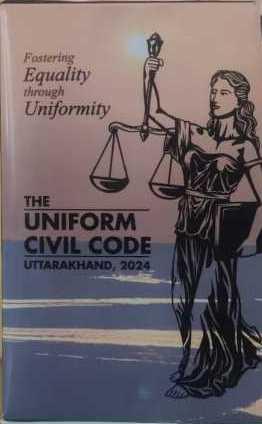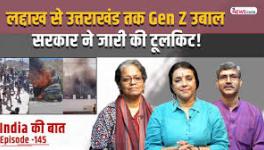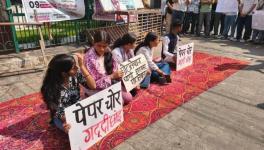UCC Challenged, Nainital HC Issues Notices to Uttarakhand, Centre

Dehradun: Nainital High Court Chief Justice Guhanathan Narender and Justice Asish Naithani issued notices on Wednesday to the Uttarakhand state as well as Union of India returnable in six weeks on a writ petition filed against the newly enacted Uniform Civil Code (UCC).
The petitioners Almasuddin Siddiqui and others through advocates Dr. Kartikey Hari Gupta, Pallavi Bahuguna, Andleeb Husain, Rafat Munir Ali and Irum Zeba through the Public Interest Litigation (PIL) petition sought order or direction in the nature of Mandamus or any other suitable order which court deem fit, seeking directions to declare certain provisions covering marriage, divorce, ‘Iddat’, Inheritance and live-in relationships of the new law claiming those to be ultra vires of the Article 14, 21 and 25 of the Constitution of India.
Specifically, the petitioner sought directions to the respondents not to implement the provisions of Sections 1 (3), 2 & Section 3 (1) (d), & Entry 36, 37 of Schedule 1 & Sections 4 (4), 23, 32, & Sections 29, 30 & Part II, Schedule II & Sections 4 (b), 378 along with entire Part III & Section 390 of the Uniform Civil Code Uttarakhand,2024 (Act no 03 of 2024).
Tushar Mehta, Solicitor General of India, appeared online on behalf of Central as well as the state government.
The petitioner Almasuddin Siddiqui, a lawyer, is the brother of film actor Nawazuddin Siddiqui. The UCC has come into force from January 27, 2025 in Uttarakhand.
The writ petition argued that the UCC infringed upon the religious practices of Muslims since Quran’ic verses and its principles are Essential Religious Practice (ERP) of the petitioners as well as members of the Muslim community. It stated that the petitioners and members of the Muslim community have a fundamental right of free profession and practice of their religion under Article 25 of the Constitution of India. Any law made by legislature that wish to stop the petitioners from free profession and practice of their religion is ultra vires of Article 25 of the Constitution, hence deserves to be declared void and inoperative.
The petitioner further argued that 3 (1) (d) along with Entry – 36 & 37 of Schedule – I of the U.C.C., 2024 prescribes “prohibited degrees of relationship for marriage which is in contravention to the “prohibited degrees of relationship” for marriage specifically provided under Chapter – 4 Verse 23 of ‘Surah-Al-Nisa’ of the holy Quran; which is the primary source of Islamic Laws in India. Since, ‘Surah-Al-Nisa’ Chapter – 4 Verse 23 of the holy Quran is in the nature of essential religious practice of the petitioners and the Muslim Community which has been violated by prescribing Entry – 36 & 37 of Schedule – I along with Section – 4 (4) and Section - 23 of the U.C.C., 2024 by prohibiting certain relationships.
The sections – 4 (4) ,23,32 violates the petitioners/members of Muslim community right to marry as per Surah-Al-Nisa Chapter – 4 of the Quran. Petitioners/Members of Muslim Community can marry to a woman except who are in “prohibited degrees of relationship” for marriage specifically provided under Chapter – 4 Verse 23 of Surah-Al-Nisa of the holy Quran.
The petition stated that Sections – 29 & 30 of the UCC, 2024, violates the religious practice of the petitioners and the Muslim community regarding divorce procedure Talaq-e-Sunnat and Iddat period which is an essential religious practice guaranteed under Article 25 of the Constitution of India and the primary source of Islamic law i.e. the holy Quran in Surah Al-Baqarah Chapter - 2 Verse 228, Hence, ‘ultra vires’ the Constitution of India and deserves to be declared void.
The petition further stated that Part – II & Schedule II of the UCC, 2024 prescribes the succession and inheritance for petitioners/Muslim community in contravention to specific prescription of succession & inheritance in Surah-Al-Nisa Chapter – 4 Verse – 11, 12 of the holy Quran which is the primary source of Islamic Law as well as essential religious practice of petitioners/ Muslim community guaranteed under Article 25 of the Constitution.
Regarding provisions of live-in relationships, the petitioners stated that Section – 4 (b) and Section – 378 along with entire Part – III of the U.C.C., 2024 are in contravention to the Article – 21 of the Constitution of India. Section – 4 (b) prescribes a vague definition of live-in relationship and hence is arbitrary, and unconstitutional.
The petition stated that Section – 378 along with entire Part – III of the UCC, 2024, prescribes the mandatory and arbitrary procedure for declaration and registration of the status of relationship by a man and woman living together/ partners/ live-in partners; which is an invasion of the privacy of a citizen by the state and its agencies and is in violation of right to privacy guaranteed to under Article 21 of the Constitution.
The right to privacy as a part of right to life is a Fundamental Right of every person, protected under Article 21 of the Constitution. Mandating every man and woman, living together/ partners/live-in partners to declare their relationship to the State and get it registered by Part – III of the UCC, 2024, violates the right to privacy of every person in most brazen and arbitrary manner, it said.
The petition contended that it is a Fundamental Right guaranteed under Articles 14, 19 and 21, viz, the Right to Life, Right to live with dignity, right to privacy to all adults to live wilfully and peacefully inside the home lawfully, without States‟ interference in the form of registration of their status of relationship, mandatory registration of the relationship of two consensual adults; is arbitrary legislation and also in violation of Part – III of the Constitution of India. Since, right to have consensual sexual relationship inside his house amongst two adults is a fundamental right and part of Right to Life under Article 21 of the Constitution.
The petition argued that the entire Part III specifically Section – 381 of the UCC, 2024, does not establish a fair and just procedure by law as it gives arbitrary and excessive power to conduct enquiry into the “personal affairs of a person” and violates the fundamental right of a person to live with dignity inside his home.
About the ‘Uniformity’, the petition said that as per Section – 2 of the UCC, 2024, the impugned legislation creates an arbitrary and artificial discrimination, impermissible in law, amongst citizens by not applying it to the Scheduled Tribes under Article 366 r/w Article 242 of the Constitution of India along with persons under Part –21 of the Constitution of India. Hence, the impugned Legislation is not a Uniform Civil Code as directed under Article – 44 of the Constitution of India hence, deserves to be declared void.
Regarding territorial jurisdiction, it argued that UCC 2024 has been enacted by the legislature of the respondent state in violation of Article 245 of the Constitution. Section 1(3) & Section 378 (2) applies the subject legislation outside the territorial jurisdiction of Uttarakhand. There is no territorial nexus between the subject and the enacting state. State of Uttarakhand has no jurisdiction to enact and apply the UCC 2024 beyond its territorial jurisdiction hence it violates the constitutional provision under Article 245 and deserves to be declared unconstitutional and void. The UCC 2024 has extra territorial operation of a state law which is impermissible and violative of Article 245 of the Constitution.
The petitioner contended that the respondent State has not included the members of petitioner’s community/Muslim community as well as well as any other community affected by the impugned legislation in its drafting and consultative process which is in violation of Article 14 of the Constitution.
The subject legislation is not a Civil Code. UCC 2024 regulates the areas of private life of a person which are not under the jurisdiction of state and protected under Article 21 of the Constitution, the petition stated.
The petitioner prayed that Section 390 of the UCC 2024 arbitrarily and abruptly abrogates the customs and usages with regard to marriage, divorce, inheritance of petitioners and members of the Muslim Community which are in the nature of essential religious practices and profession of religion protected under Article 25 of the Constitution. Hence, Section 390 is in violation of Part III of the Constitution and deserves to be declared void and inoperative.
The petition stated that the respondents being, “State” u/a 12 of the Constitution of India has a duty to act reasonably, without arbitrariness and in accordance with the provisions of the Constitution.
The writer is a freelancer based in Dehradun, Uttarakhand.
Get the latest reports & analysis with people's perspective on Protests, movements & deep analytical videos, discussions of the current affairs in your Telegram app. Subscribe to NewsClick's Telegram channel & get Real-Time updates on stories, as they get published on our website.
























